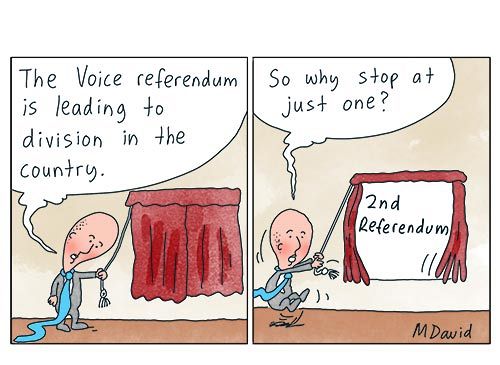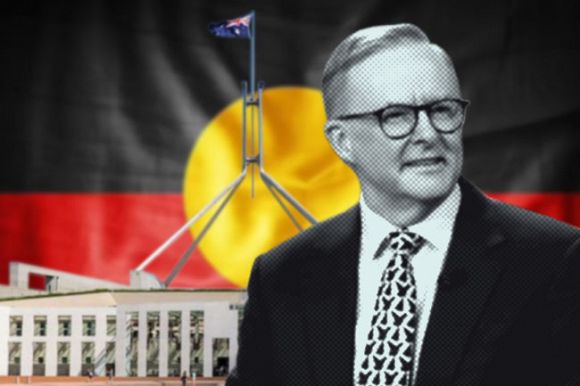Dr Jeff McMullen AM discusses the fundamental need for a Voice to Parliament to address the disproportionate burdens faced by First Nations Australians.
THERE IS NO GOOD reason to vote "No" in the upcoming Voice Referendum. The abundance of evidence that good advice leads to better policy needs far more careful attention.
In fact, there may be overwhelming benefit from all Australians voting "Yes" to listen to Aboriginal and Torres Strait Islander people.
Look at the big picture.
We have been warned that in our lifetime we are expected to face another ominous pandemic. Our fellow citizens most vulnerable to this threat posed by mutating viruses are the First Peoples and most recently arrived immigrants.
The early response to the COVID-19 pandemic by Aboriginal community-controlled health services most certainly prevented a catastrophe. Each local community communicated their special needs. Aboriginal doctors and health teams coordinated the rapid action required. The enormous benefits of this efficient advisory process flowed to others, restricting the spread of illness. This grassroots response also saved the over-allocation of critical funding, always in short supply.
Governments listened to Aboriginal voices and our nation was stronger. But this rarely happens in the current government-dominated system.
The Australian Indigenous Doctors’ Association (AIDA) of which I am a patron has highlighted the evidence for urgently changing the approach to widespread Indigenous disadvantage.
In an open letter, Wiradjuri woman, registered nurse and CEO of AIDA, Donna Burns, has made a desperate and inspiring plea for voters to look at how the current system is rigged against better outcomes for her people:
This Referendum is more than politics, it is personal, however let’s stick to the facts.
Aboriginal and Torres Strait Islander people continue to die, on average, 8.2 years earlier than non-Indigenous people in Australia.
We are 2.9 times as likely to have long-term ear or hearing problems as children, a loss of hearing impacts behaviours, education, and wellbeing.
We are 2.7 times as likely to experience high or very high levels of psychological distress, due to the impacts of intergenerational trauma and culturally unsafe systems, and our children are 2.1 times more likely to die before their fifth birthday.
Aboriginal and Torres Strait islander people are 2.3 times more likely to live with chronic disease.
The gap is widening.
Ms Burns indicated that the gap is actually widening and:
'...If these facts tell us one thing, they tell us of a system that is not working. A system that cannot go on in the same way (and I would question anyone who suggested that colonisation has not had an impact on Indigenous people in Australia.’
The proposed Voice to Parliament and Executive Government could establish the right priorities, urgently responding to many of these life-threatening health disasters.
A holistic, community-based prevention approach to obesity could slow the avalanche of end-stage renal illness beginning to strain many hospitals.
Rheumatic heart fever and otitis media will only be eliminated by community programs that are adequately funded for the first time after decades of neglect.
Foetal alcohol spectrum disorder (FASD) can only be reduced with locally tailored efforts, nationwide education and adequate government funding.
The disproportionate burden of disability experienced by Aboriginal and Torres Strait Islander communities is best addressed by boosting the capacity of community-controlled support teams. Fundamentally, better understanding the First People’s view of sickness, community turmoil, mental illness, birthing and death would improve the quality of so many lives.
Come with me to meet the mother of a newborn Aboriginal child. Look at the infant’s lifelong prospects. You know the facts, all those dreaded Gaps measured painfully each year by failing Governments. As you listen to the mother murmur to her babe, think about how the system is rigged against them.
The mother will tell you that living on less than $500 a week, our nation’s official poverty line, all the children in her overcrowded and underserviced house are usually hungry. Too often they do not thrive because they are malnourished. Seriously. This is occurring in a country that exports food. One in two Indigenous people live under the poverty line.
Some very young mothers see their newborns endure a worse fate. Before they have suckled the baby on their breast the Government removes the child on a heartless journey away from family. Around 23,000 Aboriginal children are deemed at risk right now. They are sent into out-of-home care — a euphemism for separation from culture and country. Some go into temporary hotels and hostels to be managed by paid carers.
If you thought the National Apology ended the pattern of the Stolen Generations you have been misled. How different outcomes would be if money were wisely invested in the well-being of families.
The evidence shows that we did not hear the families most desperate for help. Before domestic violence, alcohol and other substance abuse created a nightmare for any of these children, why hasn’t the government listened?
Too many children removed from family end up alienated and confused about where they fit into a society that does not see them. Other than a regular shadowy glimpse on the nightly news as the kids run wild, we do not hear their voices. Instead of finishing school, too many turn to vandalism and petty crime, some entering the juvenile justice system at just ten to 12 years old. Too many will be caged in adult prisons for much of their lives. Too many will end their lives, feeling everything is hopeless.
WITHIN 24 hours of a community meeting held late last month, Palm Island leaders formed a new Night Patrol, which has seen a “one hundred per cent reduction in property offences” Mayor Mislam Sam says.
— Koori Mail (@koorimailnews) May 29, 2023
READ more in our current edition: https://t.co/nzpx1FMD7c#PalmIsland pic.twitter.com/DHm1mbt7El
On Palm Island, Queensland recently, the Aboriginal community wanted to start a capable night patrol to ensure children were off the streets at night and all families felt protected. The Mayor took the plan to the Queensland Government and on it went to the Federal Government. With extremely rare, efficient cooperation the three parties split the costs. That night patrol will save lives. Governments listened to good advice. This is the process that a local, state and national level Voice could streamline to steadily achieve better outcomes.
If you look deeper into all the arguments offered for or against the proposed Voice to Parliament and Executive Government, you will find surprisingly that just about everyone agrees on the fundamental problems slowing the progress of the First Peoples.
Former Prime Minister John Howard, though an ardent opponent of the Voice to Parliament, bluntly admitted why life had not improved for so many Indigenous people:
“We don’t have good government in this area and over a period of thirty years we have gone from one phase to the next.”
Another two former Prime Ministers, the late Malcolm Fraser and Bob Hawke, both discussed at length with me the failure of governments to listen and deliver on the desperately needed action requested by the First Peoples. Hawke told me that this was his greatest regret as a leader.
It is time to listen and to act.
Journalist, author and filmmaker, Dr Jeff McMullen AM, is a patron of the Australian Indigenous Doctors Association (AIDA) and the First People’s Disability Network (FPDN), both of which officially support the "Yes" campaign. He is an ambassador for NOFASD Australia.
#QandA Highlights: "Yes" campaigner Noel Pearson discusses the specifics of the Voice and why they will be decided by parliament if the referendum passes.
— ABC News (@abcnews) October 2, 2023
Watch the full episode here: https://t.co/NhxCCQ3zhO pic.twitter.com/oU9ZkLMwxo
Related Articles
- EDITORIAL: The Voice looks at the big picture: It's time to listen and act
- Voice to Parliament a chance to minimise Indigenous child imprisonment
- Voice vital to the rights of First Nations people
- White greed and corruption motivations for Indigenous Voice
- Everything you need to 'No' for the Voice Referendum
 This work is licensed under a Creative Commons Attribution-NonCommercial-NoDerivs 3.0 Australia License
This work is licensed under a Creative Commons Attribution-NonCommercial-NoDerivs 3.0 Australia License
Support independent journalism Subscribe to IA.















